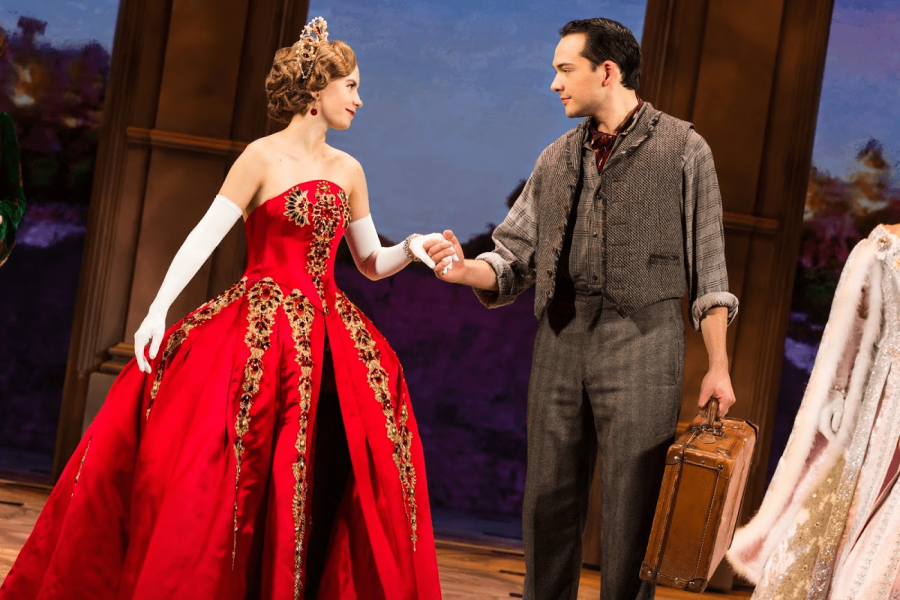“Anastasia” beautifully showcases an incredible cast of voices and vibrant visuals but at times lacks appropriate plot execution.
“Anastasia” is a musical based on the 1997 animated film of the same name. The story begins in 1906 St. Petersburg, with Anastasia and her grandmother, the Dowager Empress Maria Feodorovna, saying goodbye and promising to meet again someday in Paris. Ten years later, in 1916, Anastasia and the royal Romanov family are attacked by the Bolsheviks. Anastasia is initially presumed dead, but citizens speculate that she may have survived. In Paris, the Dowager Empress promises a reward to anyone who can find her. As the Bolshevik regime amasses power, St. Petersburg becomes Leningrad and many of the people are poor and destitute. In an effort to escape these conditions and become rich, con men Dmitry and Vlad plan to hire a girl to play the role of Anastasia. The men meet Anya, an amnesiac street sweeper who only remembers a promise to meet in Paris, and teach her to become a fake Anastasia. However, their efforts are complicated when Gleb Vaganov, a Bolshevik general, discovers their plan and follows them to Paris, hoping to wipe out the last of Russian royalty.
The strongest aspect of the musical is the singing capabilities of the cast. Lila Coogan (Anastasia), sings with the clarity of a Disney princess, and Stephen Bower’s rendition of Dmitry showcases his incredible vocal range. Jason Michael Evens as Gleb Vaganov evokes the powerful singing of broadway legend, Ramin Karimloo, who I later found played Gleb in the original cast of “Anastasia” in 2015. The original film is also a musical, yet this new rendition of “Anastasia” adds sixteen new numbers and maintains a more historical and political tone throughout, doing away with the film’s supernatural elements. Though for the most part, they pale in comparison to iconic songs such as “Once Upon a December” and “Journey to the Past,” there are a few new gems such as “Land of Yesterday” and “In a Crowd of Thousands.” Unfortunately, a majority of the numbers contain a large amount of plot exposition with important lyrics, which, at times, can be difficult to make out.
Another wonderful facet of the musical was its creative set, which utilized three large screens and moving props such as a fountain and train carriage. The animations on the screens convinced the audience to sink into Anya’s journey and recall memories from the past. I also appreciated the amount of detail that was put into each scene. At one point, the characters watch the ballet, “Swan Lake,” which, I was delighted to note, featured very skilled and professional ballet dancers, a precaution that is not always a priority to musicals with ballet numbers. This detail-oriented treatment extended to the beautiful and extravagant costumes as well, which evoked characteristic fashions of the 1920s and traditional Russian garments. These wonderful visual effects only enhanced the performances of a truly talented cast.
That being said, there were certain areas that could have been improved, namely a few points of plot execution. At times the story’s pacing was awkward, particularly at the end of Act I, where incidents that seem to contribute little to the plot caused it to drag on unnecessarily. I also wondered at the musical’s oversimplification of such a highly complex historical event as the Russian Revolution, which is then essentially used as a vehicle for a love story. Additionally, as I mentioned prior, there were a few moments that lacked clarity. For instance, there were multiple occasions where it was easy to mistake Dmitry for Gleb, and vice versa, as they don similar attire and, at a distance, looked extremely similar. Another aspect of the story that lacked complete coherence was Gleb’s backstory and motivation to stop Anastasia, which is only exposed in song, and therefore, is easy to miss or hear incorrectly.
Finally, and perhaps most disappointingly, I found that Anya’s characterization was highly inconsistent and lacked logical nuance. At times, she was a frail, delicate ingenue, while at others, she was an almost caricatured “Strong, Independent Woman,” single-handedly knocking out six bad guys on her own in a fit of rage. Sometimes she was fearless and would say so, while at others, she resigned herself to her fate and simply gave up. Though these traits could potentially coexist in a nuanced, well-thought-out character, in this case, these qualities didn’t always align with the situation at hand. Instead, her personality traits were mismatched in a seemingly random way in order to fulfill the requirements of a “multifaceted female character,” which had a jarring and disjointed effect overall.
Ultimately, “Anastasia” impressed with gorgeous visuals and incredible voices but fell short with regard to a consistently coherent plot and Anastasia’s character design. It does, however, manage to expand the film’s plot to a greater degree of complexity that allows relationships between characters to develop in a more natural way, and it is at times, very funny. I would encourage fans of the film to see the musical, as it brings back a classic story with slightly more realistic historical framing.
Opened: October 1, San Diego Civic Theater
Starring: Lila Coogan, Steven Brauer, Edward Staudenmayer
Grade: B








